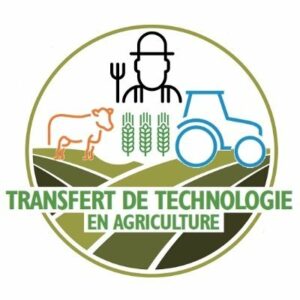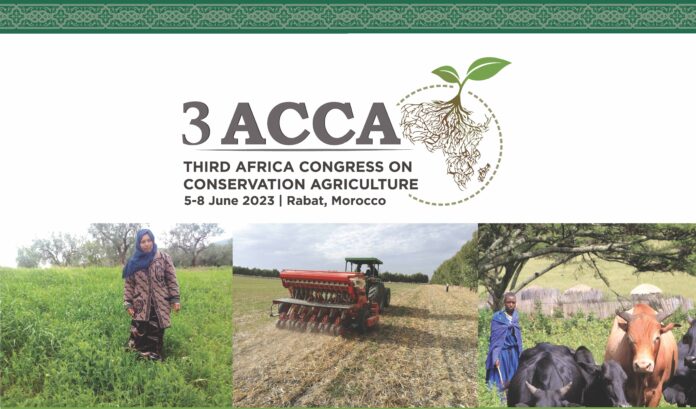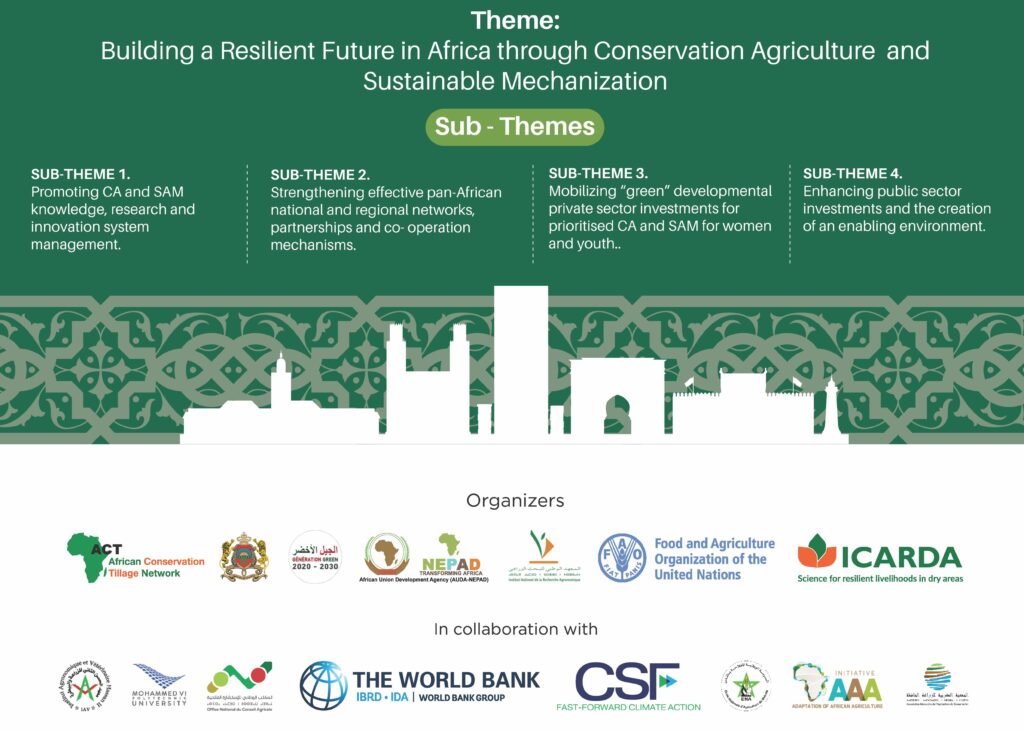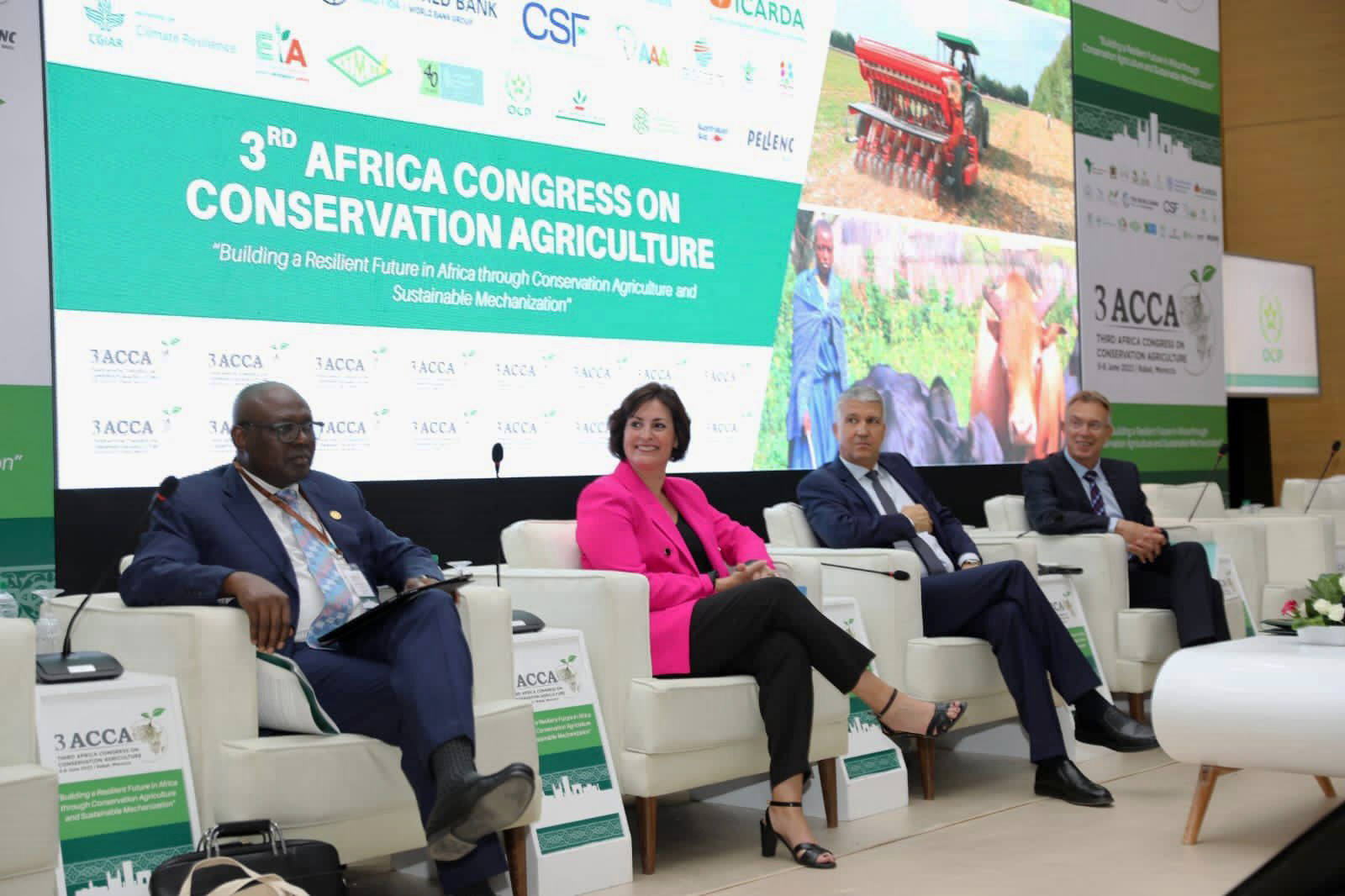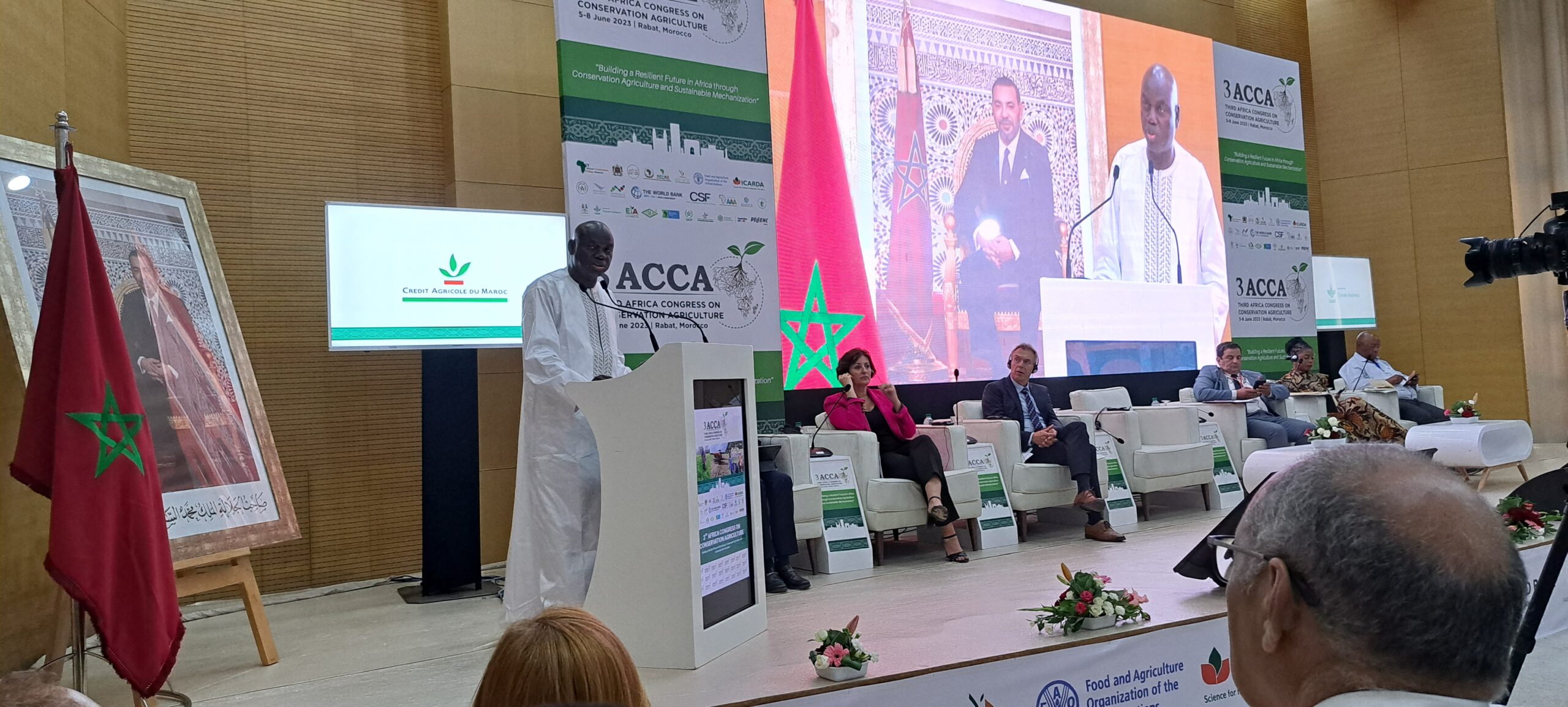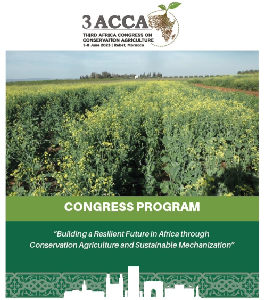sous le thème
“Construire un avenir résilient en Afrique par l’agriculture de conservation et la mécanisation durable”
5-8 juin 2023 à Rabat (IAV Hassan II)
 Prof. Mohammed SADIKI, Ministre de l’Agriculture, de la Pêche Maritime, du Développement Rural et des Eaux et Forêts a présidé l’ouverture du 3ème congrès africain sur l’agriculture de conservation (3ACCA) organisé du 05 au 08 juin 2023 sous le thème “Construire un avenir résilient en Afrique par l’agriculture de conservation et la mécanisation durable”.
Prof. Mohammed SADIKI, Ministre de l’Agriculture, de la Pêche Maritime, du Développement Rural et des Eaux et Forêts a présidé l’ouverture du 3ème congrès africain sur l’agriculture de conservation (3ACCA) organisé du 05 au 08 juin 2023 sous le thème “Construire un avenir résilient en Afrique par l’agriculture de conservation et la mécanisation durable”.Le congrès est organisé en collaboration entre le Consortium National de Recherche Agricole (INRA-IAV Hassan II – ENA de Meknès), l’Office National du Conseil Agricole (ONCA), le Réseau africain de l’agriculture de Conservation (ACT), la Commission de l’Union africaine, l’Agence du NEPAD, l’Organisation des Nations Unies pour l’alimentation et l’agriculture (FAO), le Centre international de recherche agricole dans les zones arides (ICARDA) relevant du Groupe CGIAR, la Banque Mondiale et d’autres partenaires nationaux (OCP, UM6P/ Al Moutmir, Crédit Agricole du Maroc, fondation AAA, AMAC).
Allocution de Mme Beth BECHDOL, Directrice générale adjointe de l’Organisation des Nations Unies pour l’Alimentation et l’Agriculture (FAO)
Allocution au nom de HE Amb. Mme Josefa Leonel Correia SACKO (Angola), Commissaire de l’Union Africaine à l’Agriculture et au Développement Rural
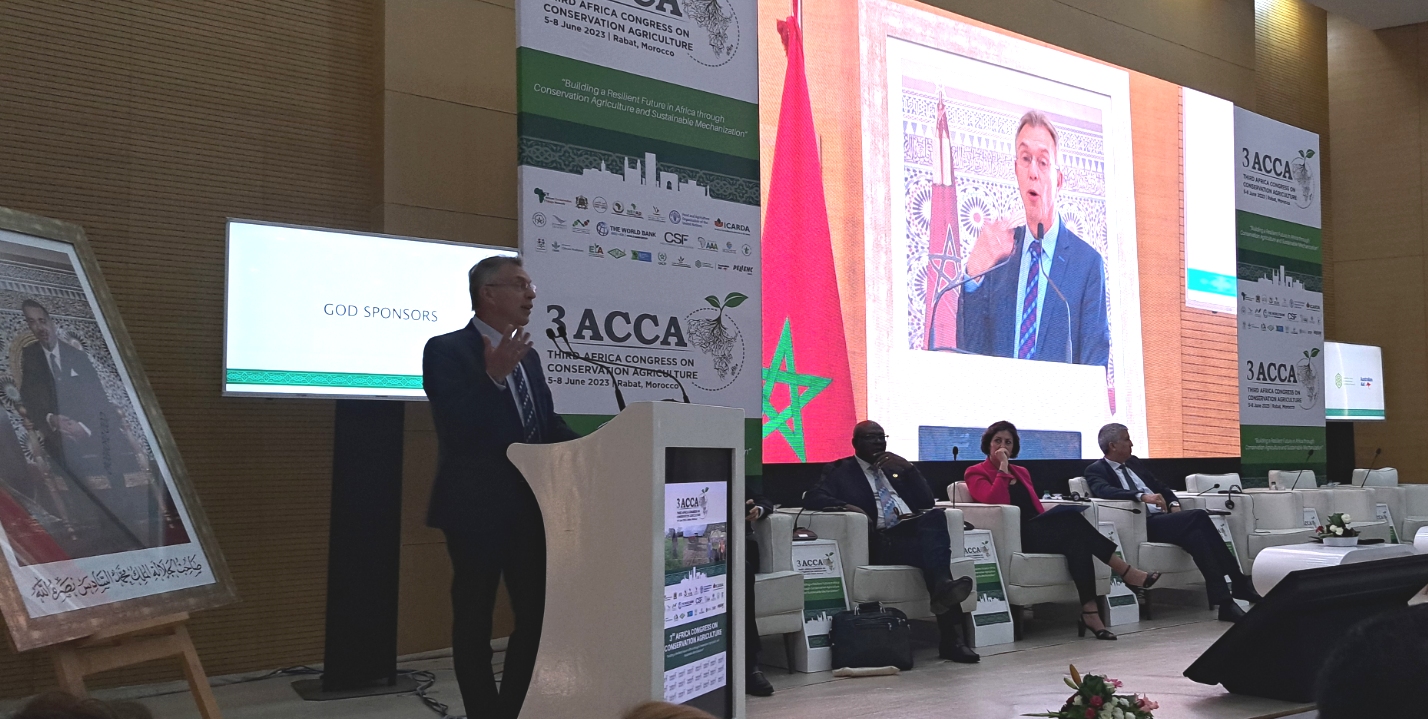
Allocution de Mr. Martin KROPFF, Directeur Général au groupe GCIAR
“3ACCA RABAT DECLARATION 2023”
DECLARATION OF THE THIRD AFRICA CONGRESS ON CONSERVATION AGRICULTURE
Rabat, Morocco, June 7, 2023
BACKGROUND
The Third Africa Congress on Conservation Agriculture (3ACCA), held in Rabat, Morocco, 5 – 8 June 2023, is in succession to the first and second African Congresses on Conservation Agriculture which were held in 2014 in Lusaka, Zambia, and 2018 in Johannesburg, South Africa, respectively. The 3ACCA, which drew 557 people (155 female) from 63 countries (32 from Africa), was a hybrid event that combined 246 in-person attendance with 311 virtual attendees, and presenters via live stream.
The 3ACCA (https://africacacongress.org/) was established with the goal of contributing to African countries’ agricultural productivity initiatives as a key component in the achievement of the Malabo Declarations’ Vision 25×25, Agenda 2063, and Sustainable Development Goals. Furthermore, the 3ACCA strengthens Africa’s position on Conservation Agriculture (CA) and Sustainable Agricultural Mechanization (SAM) and improves effective participation at the 9th World Congress on Conservation Agriculture (9WCCA), which will be held in South Africa in July 2024.
The 3ACCA aimed to bring together experts, practitioners, and policymakers from various sectors and interest groups at all levels of agriculture development from the public, private, and civil sectors to share best practises and exchange knowledge and information in order to expand Africa-wide adoption of CA and SAM as the sustainable and regenerative foundation for building resilience to climate change, rising food and energy prices, and disruptions in agrifood systems.
PREAMBLE
Recognising the importance of countries developing or aligning policies with the SDGs, international norms, and African multilateral accords;
Recognising the dangers of future disruptions to agrifood systems due to extreme weather, climate change, land degradation, pest epidemics, geopolitics, and social upheavals;
Noting emerging digital, technology, and mechanisation opportunities for all sectors, including agriculture;
Noting the importance of strengthening effective pan-African national networks, partnerships, and methods of collaboration;
Given the pressing need to expand CA-based Climate Smart Agriculture and SAM to achieve food security and sovereignty, sustainable incomes, and resilient communities;
Noting the importance of policy support for development finance and investments in Africa by implementing resilient agricultural system practices such as CA and SAM;
Recognising the need of increasing public and private sector investments and creating an enabling environment to promote CA and SAM;
Recognising the need for African manufacturers and service providers to scale CA and SAM;
Furthermore, noting the potential for CA as the best carbon farming solution to promote soil health, biodiversity and ecosystem functions;
Recognising the importance of fostering CA and SAM knowledge and innovation system management and its application for scaling, including the opportunities for youth and women as farmers, as well as equity for all agricultural workers;
Recognising the importance of expanding intergenerational education and training for CA and SAM scaling in Africa;
THE RESOLVE
The Third Africa Congress on Conservation Agriculture resolves that in order to achieve the scaling of CA and SAM in Africa in line with the Malabo Declaration and Agenda 2063:
1) Policymakers and stakeholders should be aware that to achieve sustainable intensification with real regenerative farming, the interlinked principles of CA must be followed and supported by SAM.
2) The African Union (AU) is urged to operationalize the Framework for Sustainable Agricultural Mechanisation in Africa (F-SAMA) in order to increase support from the UN and donor organisations and its adoption by African states.
3) Countries revitalise and/or establish joint CA and SAM institutional focal points, centres of excellence, and network coordination to support locally relevant partnerships and innovation platforms that can engage with government, development partners, CA farmer organizations and the business sector.
4) Countries build data and financial literacy on CA and SAM at the enterprise, project, programme, and national levels to use in developing policy, business, investment plans for CA and SAM, as well as leveraging public, private, and civil society sources of investments for scaling CA and SAM.
5) CGIAR and national research entities working in Africa prioritise the development and sharing of CA and SAM findings and knowledge of initiatives to accelerate the adoption of resilient agricultural practices in Africa.
6) To achieve widespread implementation, countries use CA and SAM agronomic research findings, and participatory on-farm knowledge, as well as simulation modelling that provide desired outputs and outcomes that meet farmers’ short-term economic aims while providing the longer-term social and environmental benefits.
7) Through CA and SAM, countries target and develop a new generation of women and youth agricultural entrepreneurs and managers.
8) Countries must set, verify, monitor, and report targets for CA and SAM areas for 2030 to cover areas for CA-based annual and perennial systems;
9) Other nations in Africa to follow Morocco’s “Generation Green 2020-2030” strategy to have 1 million hectares under no-till systems by 2030, to lead and adopt CA for the multitude of benefits, inter alia, for carbon farming in order to reap benefits from carbon markets and certifications.
10) Agricultural universities throughout Africa create CA and SAM comprehensive curricula and deliver them for intergenerational teaching and learning that encompasses adult/continuous education, schools and colleges, and the university.
11) Countries formulate technical and professional training requirements for SAM to seek vocational training financing from governments and development partners in order to develop capacities for SAM R&D, extension, education and training in each country.
12) Countries commit to contribute content and encourage the use of AfricaMechanize, a digital online platform for SAM, to support the scaling of CA and SAM in Africa.
13) ACT, FAO, NEPAD and AU are called upon to sensitise and enable governments and agricultural development stakeholders in the public, private and civil sectors on the value of supporting the implementation of the Malabo Declaration CSA Vision 25×25, the Initiative for the Adaptation of African Agriculture (AAA) and F-SAMA as a natural guide in the promotion of scaling of CA and SAM in Africa.

